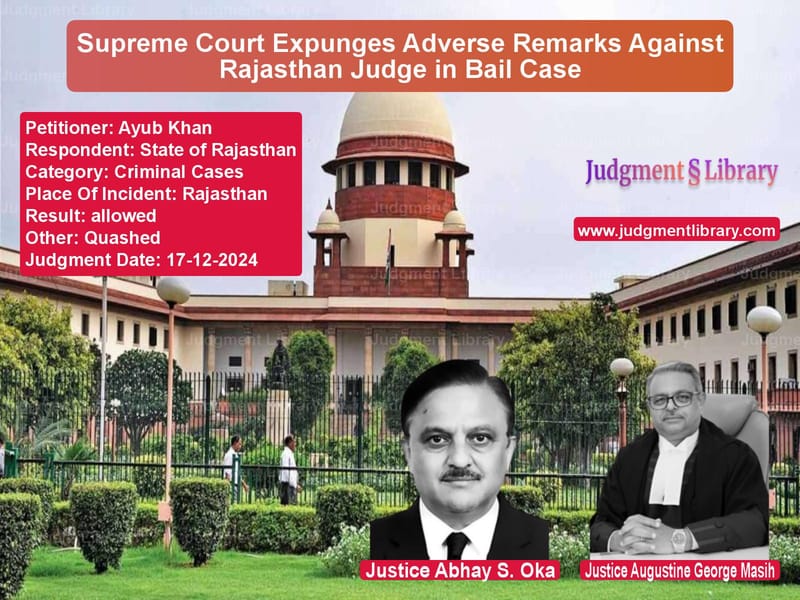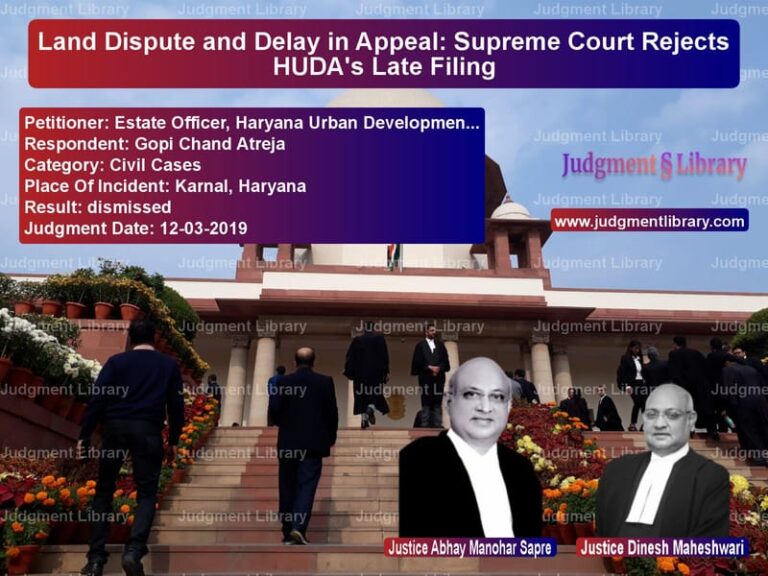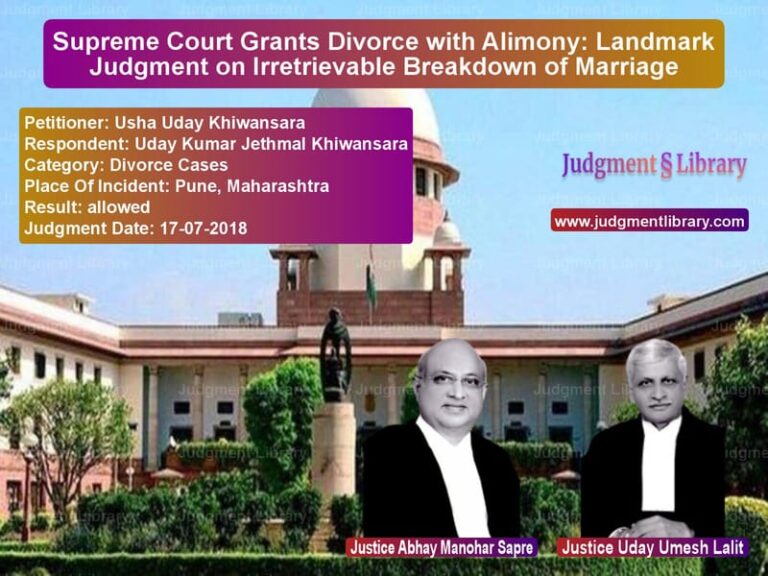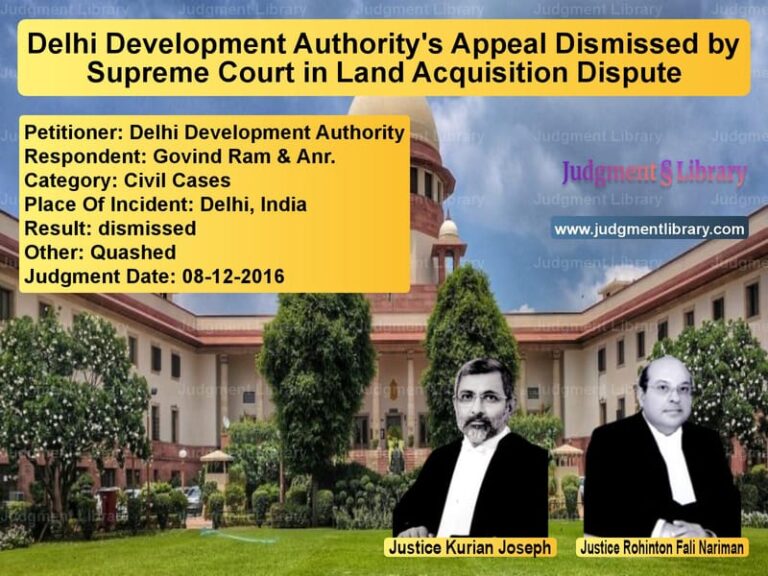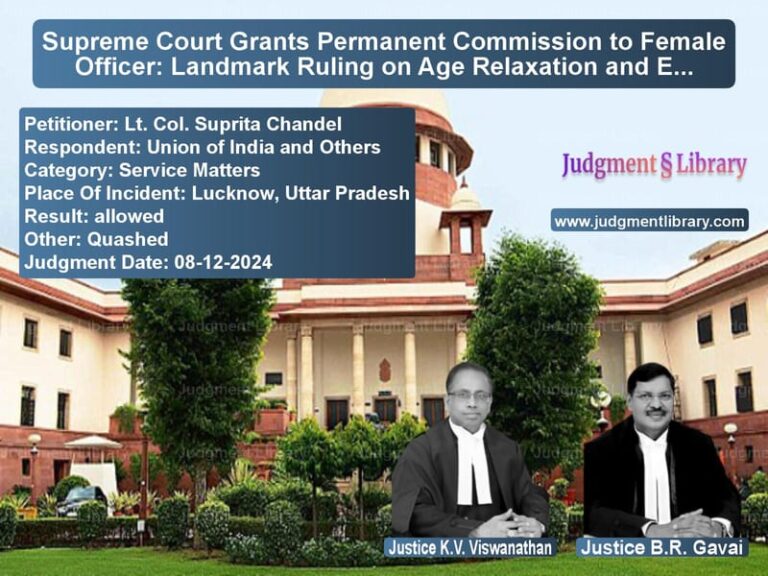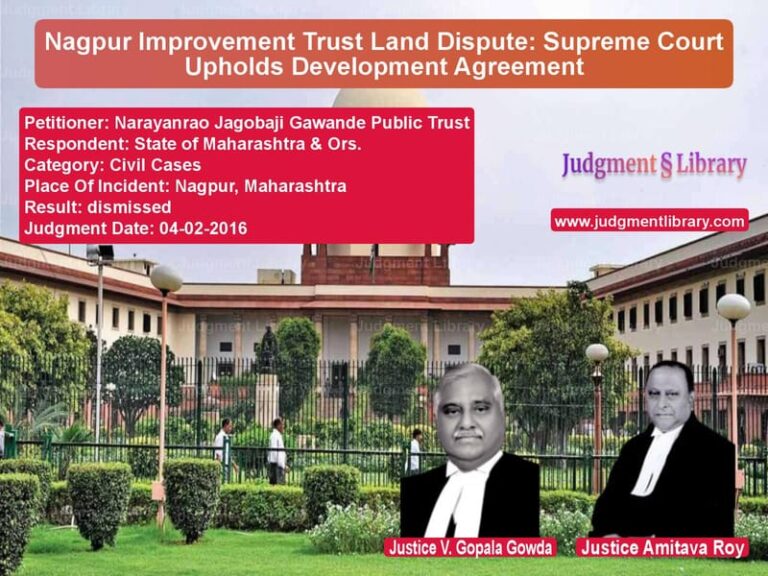Supreme Court Expunges Adverse Remarks Against Rajasthan Judge in Bail Case
The Supreme Court of India has ruled in favor of Ayub Khan, a District and Sessions Judge in Rajasthan, by striking down adverse remarks made against him by the Rajasthan High Court. The High Court had criticized Khan for allegedly failing to comply with directions regarding the format for recording criminal antecedents in bail orders. The Supreme Court held that such judicial interference in administrative matters was unwarranted and set aside all adverse findings against the judge.
Background of the Case
The case arose from a bail application heard by Ayub Khan, who was serving as a District and Sessions Judge. The accused in the case was charged under:
- Section 307 IPC (Attempt to murder)
- Section 34 IPC (Common intention)
- Sections 3, 3/25, and 5/25 of the Arms Act, 1959
Ayub Khan denied bail to the accused, leading the accused to file a fresh bail application before the Rajasthan High Court. While granting bail, the High Court made critical remarks against Ayub Khan, claiming that he had failed to follow the court’s prescribed format for recording antecedents in bail orders.
Read also: https://judgmentlibrary.com/bail-under-uapa-supreme-courts-judgment-on-athar-parwezs-case/
High Court’s Observations
The Rajasthan High Court had previously issued guidelines in the case of Jugal Kishore vs. State of Rajasthan, directing all trial courts to include a detailed chart of an accused’s criminal antecedents when granting or rejecting bail. These guidelines mandated:
- All bail orders must include details of an accused’s criminal record.
- If no prior cases existed, the order must explicitly state that.
- Public prosecutors must ensure that antecedent reports are available before bail hearings.
In Ayub Khan’s case, the High Court found that his order only stated that the accused had 10 prior criminal cases but did not present them in the prescribed tabular format. The High Court took issue with this omission and warned that failure to comply with the directive could amount to “judicial indiscipline” and even “contempt of court.”
High Court’s Directions Against Ayub Khan
Following its observations, the High Court:
- Issued a notice to Ayub Khan, requiring him to explain his failure to use the prescribed format.
- Directed him to submit a list of all bail orders he had passed in February 2023 and confirm whether he had followed the format.
- Forwarded the matter to the Chief Justice of the Rajasthan High Court for further action.
Supreme Court’s Examination
The Supreme Court, led by Justices Abhay S. Oka and Augustine George Masih, strongly criticized the High Court’s actions. The Court ruled that:
1. High Courts Cannot Mandate a Particular Format for Bail Orders
The Supreme Court emphasized that while High Courts can set legal principles for granting bail, they cannot dictate the exact structure of judicial orders.
“No Constitutional Court can direct the Trial Courts to write orders on bail applications in a particular manner.”
2. Non-Compliance with Format Does Not Constitute Indiscipline
The Supreme Court found that failing to include a chart of antecedents did not amount to disobedience or contempt.
“We fail to understand how the appellant committed acts of indiscipline or contempt by not following the suggestion incorporated in paragraph 9.”
3. Judicial Discretion Must Be Respected
The Supreme Court noted that antecedents are only one factor in bail decisions. In some cases, long incarceration or default bail might render criminal history irrelevant.
“If the directions in Jugal Kishore are to be strictly implemented, Courts may have to adjourn bail hearings just to obtain antecedent reports.”
4. High Court Wasted Judicial Resources
The Supreme Court also criticized the Rajasthan High Court for unnecessarily consuming judicial time.
“Undertaking such an exercise was a waste of precious judicial time of the High Court which has a huge pendency.”
Final Judgment
The Supreme Court ruled:
- All adverse remarks against Ayub Khan were expunged.
- The High Court’s direction to submit bail orders and lists was quashed.
- The order to forward the case to the Chief Justice for disciplinary action was set aside.
- The ruling was forwarded to the Registrar General of Rajasthan High Court to inform the Chief Justice.
Implications of the Judgment
This ruling has major implications for judicial independence:
- Reaffirmation of Judicial Discretion: Trial court judges cannot be forced to follow rigid templates.
- Limitations on High Court Powers: High Courts cannot impose administrative burdens on judges through judicial orders.
- Protection of Judges: Ensures that judicial officers are not unfairly targeted for minor procedural issues.
- Efficient Use of Judicial Resources: Reinforces that courts should focus on substantive justice rather than procedural formalities.
Conclusion
The Supreme Court’s ruling in Ayub Khan vs. State of Rajasthan is a landmark decision protecting judicial officers from arbitrary administrative control. By striking down the High Court’s adverse observations, the ruling reinforces the principle that judges must be free to exercise their discretion without fear of unwarranted disciplinary action. The case serves as an important reminder that judicial independence is fundamental to the fair administration of justice.
Petitioner Name: Ayub Khan.Respondent Name: State of Rajasthan.Judgment By: Justice Abhay S. Oka, Justice Augustine George Masih.Place Of Incident: Rajasthan.Judgment Date: 17-12-2024.
Don’t miss out on the full details! Download the complete judgment in PDF format below and gain valuable insights instantly!
Download Judgment: ayub-khan-vs-state-of-rajasthan-supreme-court-of-india-judgment-dated-17-12-2024.pdf
Directly Download Judgment: Directly download this Judgment
See all petitions in Bail and Anticipatory Bail
See all petitions in Contempt Of Court cases
See all petitions in Custodial Deaths and Police Misconduct
See all petitions in Judgment by Abhay S. Oka
See all petitions in Judgment by Augustine George Masih
See all petitions in allowed
See all petitions in Quashed
See all petitions in supreme court of India judgments December 2024
See all petitions in 2024 judgments
See all posts in Criminal Cases Category
See all allowed petitions in Criminal Cases Category
See all Dismissed petitions in Criminal Cases Category
See all partially allowed petitions in Criminal Cases Category

